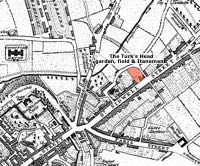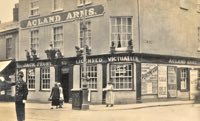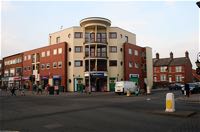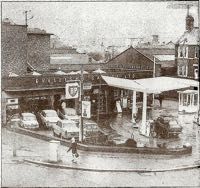
Acland Arms Hotel
Also known as the Turk's Head and Royal Mail Coach Inn
Page added 2nd December 2019
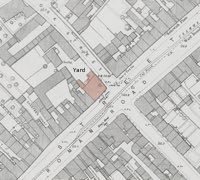 It
is known that an inn named the Turk's Head was situated on the site of
the modern Co-op, on the corner of York Road, from at least 1799.
Further proof of its existence is an advert in the Flying Post during
January 1804, when the Turk’s Head was put up for sale by Joseph
Bowden, with three tenements, a garden and a field, said to be
suitable as a building plot. It was described as “that
well-accustomed PUBLIC HOUSE.” Later, a name change took place,
for in 1830 a directory listed it as the Royal Mail Coach Inn, with
John James Lawless as the proprietor. Despite its new name, it was at
the wrong end of Sidwell Street to prosper from the coaching trade to
Bath and Bristol.
It
is known that an inn named the Turk's Head was situated on the site of
the modern Co-op, on the corner of York Road, from at least 1799.
Further proof of its existence is an advert in the Flying Post during
January 1804, when the Turk’s Head was put up for sale by Joseph
Bowden, with three tenements, a garden and a field, said to be
suitable as a building plot. It was described as “that
well-accustomed PUBLIC HOUSE.” Later, a name change took place,
for in 1830 a directory listed it as the Royal Mail Coach Inn, with
John James Lawless as the proprietor. Despite its new name, it was at
the wrong end of Sidwell Street to prosper from the coaching trade to
Bath and Bristol.
The land at the rear of the inn came in useful in November 1833 when the circus came to town.
RYAN's ROYAL EQUESTRIAN CIRCUS
At the Back of the Mail Coach Inn. St. Sidwell's, EXETER
ON MONDAY, Dec. 2, 1833, and every Evening during the Week, a GRAND
CHANGE of PERFORMANCE will take Place, particulars of which will be
expressed in Bills of the Day.
Mr. Ryan wishes to impress on the minds of the Public, that his stay
in Exeter will be much shorter than he intended, he having made
Engagements in Bath to open his Circus there. Mr. R. is proud to
assert to the Inhabitants of this City and its Environ, that the
present Company is allowed far superior any ever seen in the Kingdom.
Front Boxes, 2s. 6d.—Side Boxes, 1s. 6d.—Pit, 1s.— Gallery, 6d.
Officers will attend—Doors open at Six o'Clock, and the Entertainment
will commence at Seven.
***Tickets may be had at the Arena, and Cullum's General
Printing-office—where Places for the Boxes may taken from Eleven until
Two. GOOD FIRES CONSTANTLY KEPT.
N.B.Equestrian Tuition by Mr. Bridges, Hiding Master. Horses Broke for
the Road or Field.
The success of the circus led to the field hosting a wrestling match in February the next year. The three top prizes were, there two and one sovereign respectfully. Such events would have ensured a healthy trade for the Royal Mail Coach.
A new landlord and a new name
The land appears on the 1839 tithe map for St Sidwells, as a house and garden belonging to the Dean and Chapter of Exeter with James Clarke in occupation. Clarke leased the property to Peter Lisson. Lisson had previously run the Temeraire (modern Sorry Head) in Blackboy Road, before taking on the Mail Coach in 1835.
Lisson had lived an adventurous life before he settled as a publican. He joined, probably as a boy soldier, the East Devon Regiment of Militia, before transferring to the Fifth Regiment of Foot, as Quarter-Master-Serjeant. He served in the Peninsular war, under Wellington, fighting at the battles of Busacoa, Sabugal, Salamanca, Fuentes de Onora, Rodrigo, Elbadon, and the siege of Badajoz. He received various military medals, and on leaving the Army in 1826, he was presented with a testimonial from General Sir Henry King, his commanding officer. So, one could say, Peter Lisson could tell many a tale, while serving his ale.
When Lisson moved in, during March 1835, he engaged workmen for some building work. The Improvements Commission had been demanding work be done to the building–they wouldn’t have been involved unless it was a danger to the street. The workmen, while digging to make cellars, uncovered an earthenware urn, containing cremated adult human remains. At first, it was assumed to be about 200 years old, but further investigation suggests it was pre Roman. There had been a Roman cemetery within a few yards, probably deliberately sited near to an existing British burial ground.
The grand opening in July 1835 was postponed, due to a delay in the paint drying, a common decorators excuse. However, when it did open, it was with a new name, the Acland Arms. Lisson was a consistent supporter of the Conservative Party in the city, and it may be that his choice of name for his public house was after Sir Thomas Dyke Acland, a conservative MP for Devon at the time. The large function room of the Acland Arms became the centre of Tory activities in Exeter over the next few years. Meetings, dinners and hustings all took place under the enthusiastic Lisson, who became a city councillor for St Davids Ward.
Soon after occupying the Acland Arms, Lisson unexpectedly inherited a property in Bath, and was soundly criticised by local Liberals, or Radicals as they were described. He was nicknamed ‘Blue Peter’ after he dyed a white hat blue, to wear when supporting his local Tory candidate. Politics could be rumbustious in the 19th Century, and yet, Lisson commandeered respect from his opponents. Charles Sclater, the nurseryman, opposed Lisson politically, and yet he planted his grave after his death, due to his respect.
At Queen Victoria’s Coronation, the Acland Arms was decorated for the occasion with a crown on cushion, and ‘tasteful’ banners. Rampaging crowds during the bread riots of July 1847, trashed a lot of businesses across the city. Several hundred rioters, led by Robert Splatt, ran up Sidwell Street, throwing stones at shop windows–The Acland Arms did not escape, windows were broken.
Peter Lisson died on 29 December 1853 at the age of 72, having run the Acland Arms for eighteen years.
The Webber family ran the Acland Arms for several years in the late 19th and first few years of the 20th century. During their tenure there was a gale in December 1900 when the lead roof off the building, weighing several hundredweight was lifted up by the wind and deposited in the street. The Webber’s were the licensee for the local brewers Carr and Quick. In 1904 the building was put up for sale as the owner, J T Taylor, had died. It consisted as a brewhouse, malt store, coach house, stabling for ten horses, a smithy, a wheelwrights shop, and an engine shed and machine shop. Bidding started at £2,000, to be sold to Mr Willis for £2,715.
During the First War years, the house was a popular venue for house and land sales, the large function room an being ideal space. The lease to the brewers expired in 1928 and the building was put up for sale. Soon after, Mr John W Frost the landlord died, just before he was to leave and run the Duke of York opposite. The license was transferred to his widow, with Mr Horton as the manager.
The Acland Arms was the last pub in Exeter to brew its own beer. Every building from the Acland Arms to St Sidwell’s Church was destroyed in the May 1942 blitz. From the church up to the Co-op was rebuilt into the shops we know today, but for some reason, the site of the Acland Arms remained empty. Eveleigh's Garage occupied the land as a second hand car lot and filling station until the middle of the 1990s, when the Co-op convenience store was built.
Sources: The British Newspaper Archive, street directories, and Sidwell Street by Hazel Harvey.
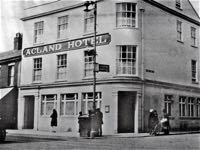
The Acland Hotel a few years before it was destroyed. Notice that the windows have been replaced and the entrance removed from the corner.
│ Top of Page │
